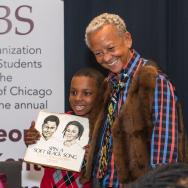For Ta-Nehisi Coates, writing is a way of telling the truth boldly—without coddling the reader, but not without offering hope.
That means acknowledging the brutal legacy of slavery and Black oppression, both throughout American history and today. It means telling a story about this country that is real and raw—that not only illuminates the Black experience, but informs an understanding of how racism has driven ongoing attacks on the electoral process.
These attacks, Coates said, have deep roots: “For the majority of American history, this country has argued to itself that Black people are not fit to be equal citizens.” Thus, the rise of Black people in electoral politics—including the election of the first Black president—has corresponded to a growing disbelief in the legitimacy of the American state.
The award-winning author delivered these remarks during the 2021 George E. Kent Lecture, hosted by the Organization of Black Students (OBS) at the University of Chicago. During his talk, Coates said his task as a writer is to draw out America’s legacy of oppression by making the subtle explicit. He does so in part by centering Black families in his fiction; in a nation built on slavery, the family is “the most precious thing that has been taken from us.”
“The physical violence of enslavement and oppression is so vicious, that you can forget more subtle things,” Coates said. “It’s obviously quite striking and quite disturbing to picture somebody being whipped …. But if you gave me a choice—and I think most parents would feel the same way—between being whipped and never seeing my child again, I’d take the whip.”
Held annually since 1984, the Kent Lecture commemorates one of the first Black professors to earn tenure at UChicago, and has featured such luminaries as writer James Baldwin, civil rights lawyer Michelle Alexander, Black Panther director Ryan Coogler and poet Nikki Giovanni.
The recipient of a MacArthur Fellowship, Coates is the author of the bestselling books The Beautiful Struggle, We Were Eight Years in Power, The Water Dancer and Between the World and Me, which won the National Book Award in 2015.
Held in partnership with the Harris School of Public Policy, this year’s event put Coates in conversation with UChicago undergraduate students Debbie Adewale and Jackson Overton-Clark, the co-political chairs for OBS. During their talk, Coates connected the oppression of Black Americans to the country’s faltering democracy.
“The vote is only as good as the citizens who believe in it,” Coates said. “And when you have—let’s be clear, a minority of Americans, but a highly motivated minority of Americans—who are intent on either having themselves at the top of the hierarchy, or [rejecting the state], you’ve got a problem.”
To illustrate the absurdity of recent attempts to challenge the 2020 election results, Coates used professional basketball as an analogy. Imagine, he said, if LeBron James suddenly declared that he would only recognize fouls that referees called against his opponent.
“At that point, you don’t have a game … and there’s no longer a league,” he said.
Though Coates used humor to make his point, he said those who seek to delegitimize the vote pose a grave and real threat. The vote, he stressed, is an “an act of nonviolence”—in place as part of a system to prevent bloody political disputes. “When folks start assaulting [the vote], you don’t really have a country anymore,” he said.
Black writers like himself, Coates said, shouldn’t bear the responsibility of changing white people’s minds; however, there are things white people can do if they want to see systems change. They begin with sacrificing white privilege.
“I think it requires a radical interrogation of your personal life and all the things that make you safe—and, as much as possible, parting with them,” Coates said, citing the example of a 75-year-old white man, a peace activist in Buffalo, New York, who was seriously injured by police during a protest in the wake of George Floyd’s murder last summer: “For that moment, he had given up his whiteness.”
As a writer, Coates emphasized the importance of narratives that acknowledge the country’s history of racial violence. He sees a trend toward more awareness of that history. While working on The Water Dancer, he visited Thomas Jefferson’s Monticello plantation and was heartened by the forthright discussion of the former president’s ties to slavery.
“They will tell you the truth,” Coates said. “There is a broad and growing movement to tell the truth.”
Video of the 2021 Kent Lecture will be available at this link until June 11, provided by Harris Public Policy to event registrants who are current UChicago students, faculty or staff. A UChicago email and CNet are needed to access the video.

